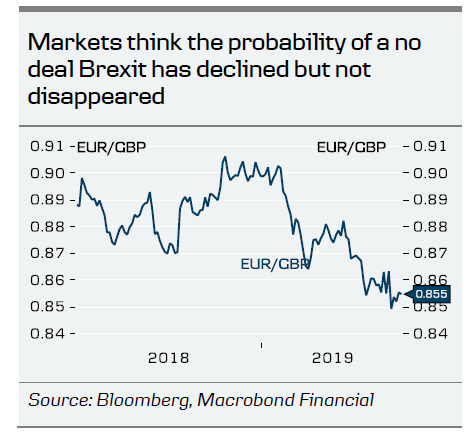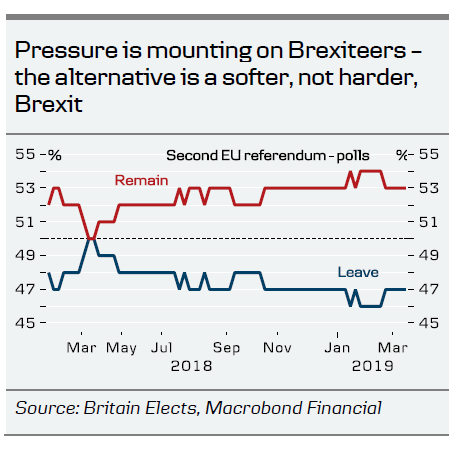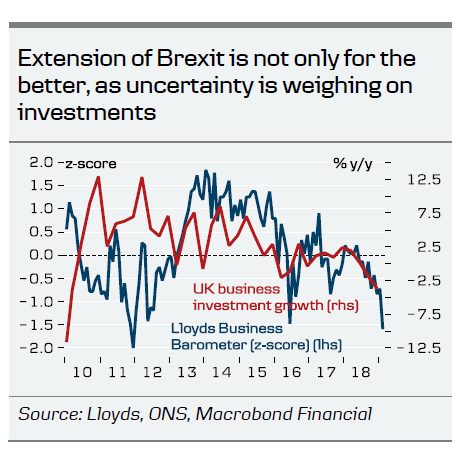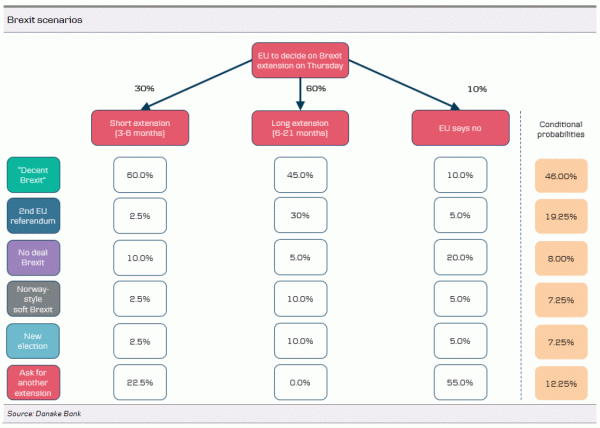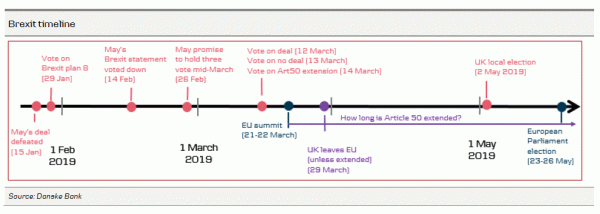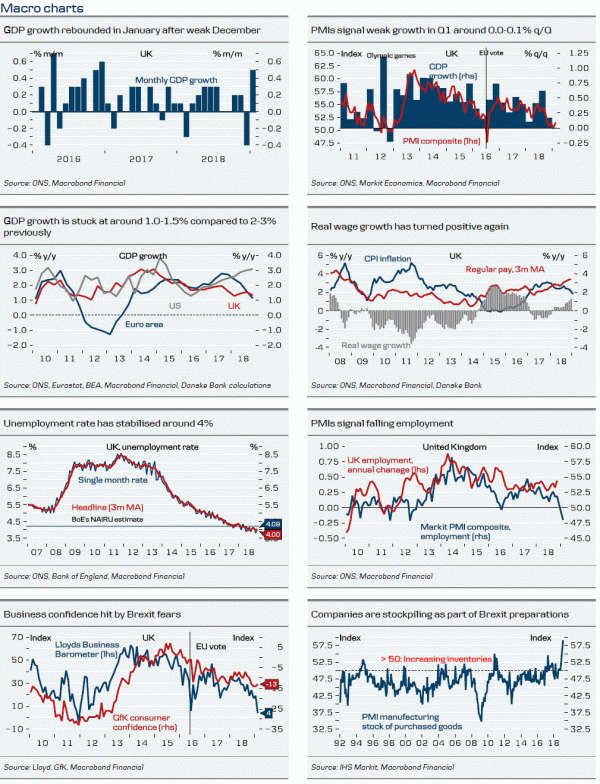Key takeaways
- Most likely no vote on the full Brexit deal before EU summit on Thursday
- We now believe that a long Brexit extension is more likely than a short one (60% and 30%, respectively). Higher chance of no deal by accident if EU leaders do not grant the extension (10% probability of this not happening).
- A long extension may increase the pressure on the Brexiteers to such a degree that they end up backing the deal. Deal may be put forward for a vote again next week – if the Speaker allows it.
- Overall, it seems like we will get a long extension or May’s deal will pass soon. We still think May’s deal passing is the most likely final outcome and a second EU referendum (after a long extension) is the second most likely final outcome.
EU to decide unanimously on Thursday
After the many votes last week, we think it is a good idea to take stock of Brexit again (see updated game tree page 3). As of today, it seems unlikely that there will be a third vote in the House of Commons on May’s Brexit deal before the EU summit starting on Thursday, 21 March. This is not only because of the lack of support but also because Speaker John Bercow has made it clear that he will (at least in principle) not allow for a third vote unless there are “substantial changes” to the current deal. The reason is that two votes on the same motion are not allowed during the same “session” (parliamentary year). The current session ends this summer. Of course, there are workarounds but all else being equal, it does not make life easier for Theresa May, as she may need to wait until July before putting it forward to a vote again. A clear workaround would be if May suddenly found a majority backing her deal, which would demonstrate to the Speaker that there is demand for voting on the deal again. Another, but less likely, workaround would be if the exit date were changed to a later deal.
The big question is how the EU27 leaders will respond when they meet on Thursday. Against what many thought before Brexit negotiations (and may still think), the EU leaders have been the real Brexit hawks, while Juncker, Tusk and Barnier have been more willing to compromise. It is clear that the EU27 leaders are annoyed about spending time on Brexit, as they have also other things to deal with, also domestically. Still, we think the EU27 leaders will end up grating the UK an extension. Yes, Brexit may be annoying and time-consuming and an extension is not only for the better, but probably still better than adding a no deal Brexit to the current mix of a slowing economy and politics turning violent (including outright terror attacks) in some countries.
If we are right, it is more about whether the EU27 will accept a short (3-6 months) or long extension (perhaps even as long as lasting until year-end 2020). The decision has to be taken unanimously by the EU27 leaders. While we previously thought a short extension was in the case, we have changed our minds and now expect a long extension (60% likely versus 30% probability for a short extension). The EU leaders will probably recognise that the benefits of a long extension are greater than for a short one.
By giving a long extension, the EU would make sure that they will not get the blame for a no deal Brexit, companies would still have free access to the UK market (the second biggest in the EU28), the UK would continue contributing to the EU budget, there would be more time to discuss the future relationship (which may end up making the much-hated Irish backstop redundant) and would increase the likelihood of the UK choosing to remain in the EU. Alternatively a long extension may increase the pressure on the Brexiteers to such a degree that they end up backing the deal and hence the long extension by itself makes clarity more likely (this also seems to be PM Theresa May’s strategy). We have already seen former Brexit Secretary David Davis now backing the deal and Jacob Rees-Mogg also seems to know that the hard Brexiteers risk the whole project by not passing May’s deal, despite thinking it is flawed. A big game changer continues to be if the DUP backs the deal, as it would be what is needed for many Brexiteers to back the deal as well. The problem for Theresa May is, however, that die hard remainers and Brexiteers will still vote against the deal, so she is still relying on support from Labour Brexiteers. They will not likely jump on board before the deal is passed. Some are speculating, despite Bercow’s reservations, that May may try bring the deal forward for a vote again next week, if her strategy works.
The problem is that a long extension is problematic for the UK. It means the UK needs to participate in the European elections (which is of course weird but perhaps not as big of a problem as some are making it out to be) and for the Conservatives it is probably not the best way to start the local election campaigns (local elections take place on 2 May). Seen from May’s perspective, it also increases the chance that her government falls if the hard Brexiteers think it is better to bring down the government as a result. Alternatively, they can just paralyse British politics by voting down everything the government puts forward. There is higher risk of a government collapse and hence also snap elections in this scenario. Another problem with a long extension is that the period with high uncertainty for companies is prolonged, which would continue to have damaging effects on the economy. As we argued in our latest Brexit Monitor: Brexit goes to overtime, 11 March, the UK economy has slowed due to Brexit fears, which is why we lowered our GDP forecasts to just 1% this year, increasing to 1.3% next year (previously 1.2% and 1.4%, respectively). Business investments in the UK fell in all four quarters last year, as companies have postponed or cancelled investment projects and businesses have started stockpiling as part of the preparations for Brexit. An extension would only prolong this and is damaging the economy, most notably in the UK, but also the EU27 companies are referring to Brexit uncertainties in e.g. businesses surveys.
Overall, it seems like we will get a long extension or May’s deal will pass soon. We still think May’s deal passing is the most likely final outcome and a second EU referendum (after a long extension) is the second most likely final outcome. See our updated game tree on page 3.
We would be more concerned if the EU leaders are not able to reach a consensus on an extension. We think the likelihood of this scenario is 10%. This would clearly increase the chance of a no deal Brexit happening but from a legal perspective, the extension can be granted until right up until the deadline.
We have published our new EUR/GBP forecasts in our FX Forecast Update: ECB stance reintensifies the FX carry hunt, 18 March. Here we argue that both May’s deal passing soon and a long extension of Brexit would eventually be positive for the GBP. Nearterm, we think EUR/GBP will remain in the 0.85-0.87 range, as an extension is probably more or less priced in at this point

